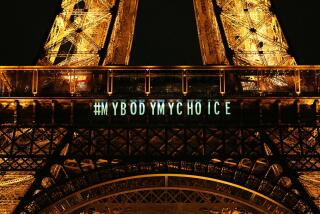Madame Steinem would approve
What’s in a title? Plenty, according to French feminists who have persuaded a town to drop the honorific “mademoiselle” on official forms.
From now on, the women of Cesson-Sevigne, population 16,000, will be addressed as “madame” regardless of age or marital status.
“Mademoiselle,” the Gallic form of “miss,” is normally used for young, unmarried women, thus, feminists say, openly declaring them either available or unwanted in a way that men, always referred to as “monsieur,” are not. A French form of “ms.” would solve the problem, but there you go.…
Exactly when a woman reaches the age when she becomes a “madame,” married or otherwise, is not only a matter of debate but a social minefield; women of a certain age will often ask themselves whether the waiter who calls them “mademoiselle” is being gallant or sarcastic.
French movie stars Catherine Deneuve, 68, once married, and Jeanne Moreau, 84 this month and three times married, prefer to be addressed as “mademoiselle” and, as a quirky exception to the rule, are allowed, as actresses, to claim that right.
“It’s about eliminating all terms that could be discriminatory or indiscreet,” the town hall at Cesson-Sevigne, a suburb of the western town of Rennes, in Brittany, said in a statement explaining that the title “mademoiselle” had been banished from all official forms since the beginning of the year. “The existence of two different terms to indicate women who are married and those who aren’t is a discrimination for women because there is no differentiation that exists for men.”
Mayor Michel Bihan, elected in 2008 on a sexual-equality platform, told the BBC, “It just seemed like the natural step for us. It’s symbolic: a signal, a gesture, but one among many.”
The town’s decision comes months after the Dominique Strauss-Kahn scandal cast a spotlight on sexism in France. After the then-head of the International Monetary Fund was arrested on sexual assault charges, later dropped, many French women were dismayed by the sexist response from some of his male supporters.
Two French feminist groups, Les Chiennes de Garde (The Watchdogs) and Osez la Feminisme (Dare Feminism), have long argued that the title should be removed from business and state forms.
Their campaigners have argued that “mademoiselle” is not only sexist and condescending but “intrusive.”
“It is therefore much more polite to call a woman ‘madame’ and by doing so to not pass judgment on her private life. The distinction ‘madame/mademoiselle’ is neither flattering nor obligatory. Above all, it is the sign of the basic sexism that endures in our society,” reads the groups’ joint campaign statement.
Before the French Revolution, the use of “mademoiselle” had little to do with whether a woman was married; a laywoman or commoner was always called “mademoiselle” to indicate she was of lowly status. Only women of high birth were addressed as “madame.” “Damoiseau,” meaning “squire” and serving as the male equivalent of “mademoiselle,” was dumped in France decades ago.
American and British women have been using “ms.” since the 1960s. Germany abolished the title “fraulein” for unmarried women in 1972.
Suffice it to say, French feminists won’t miss the “mademoiselle.”
Willsher is a special correspondent.
More to Read
Start your day right
Sign up for Essential California for news, features and recommendations from the L.A. Times and beyond in your inbox six days a week.
You may occasionally receive promotional content from the Los Angeles Times.






